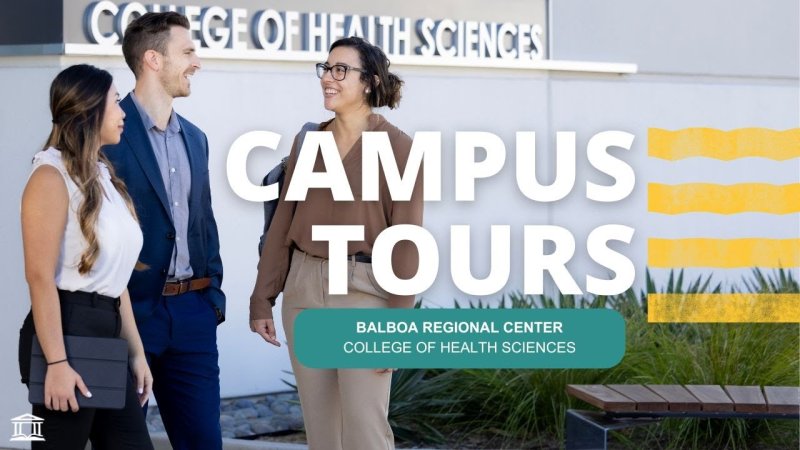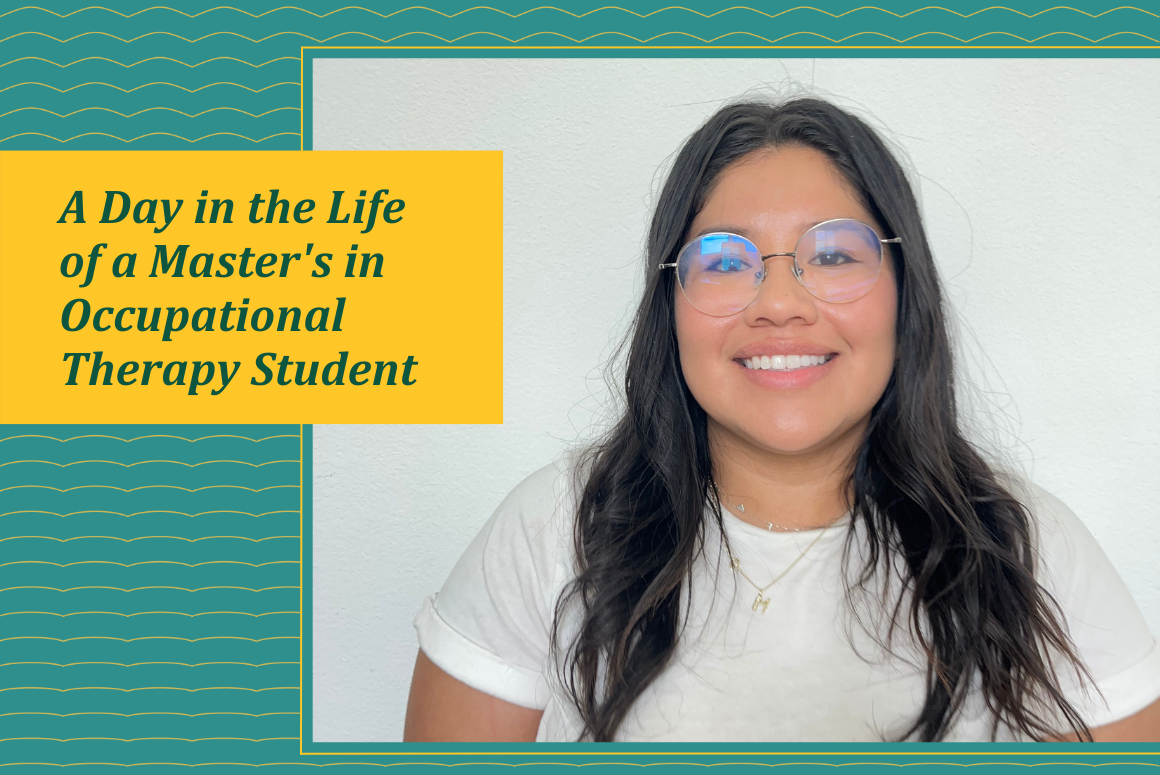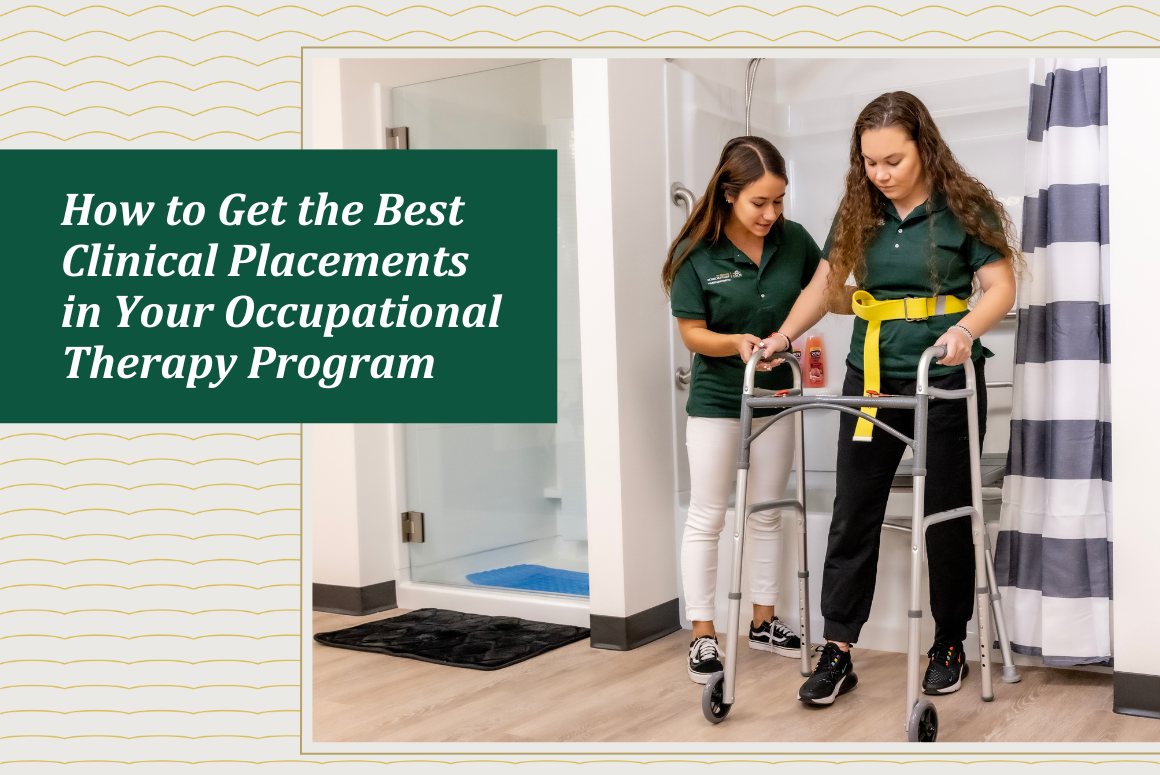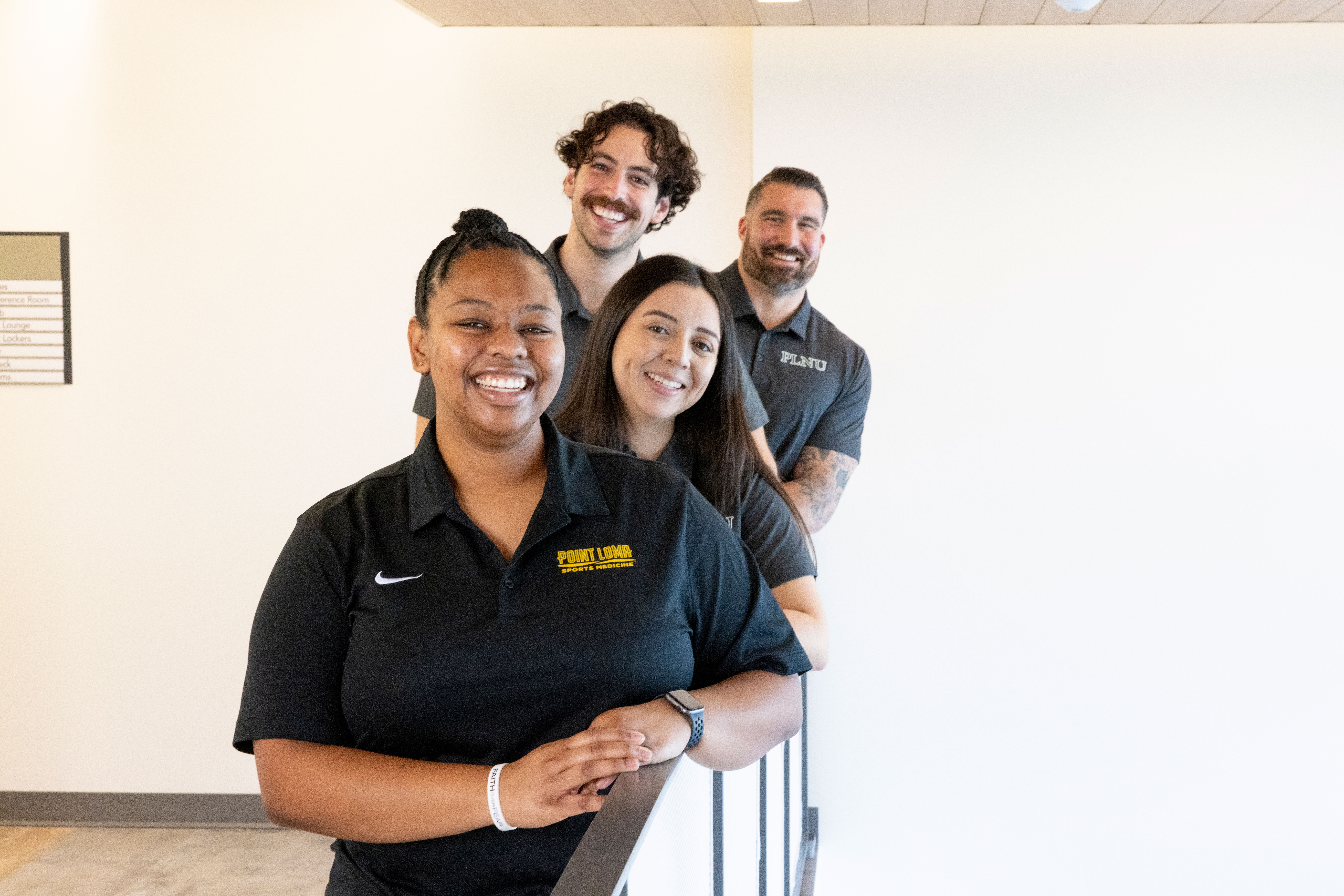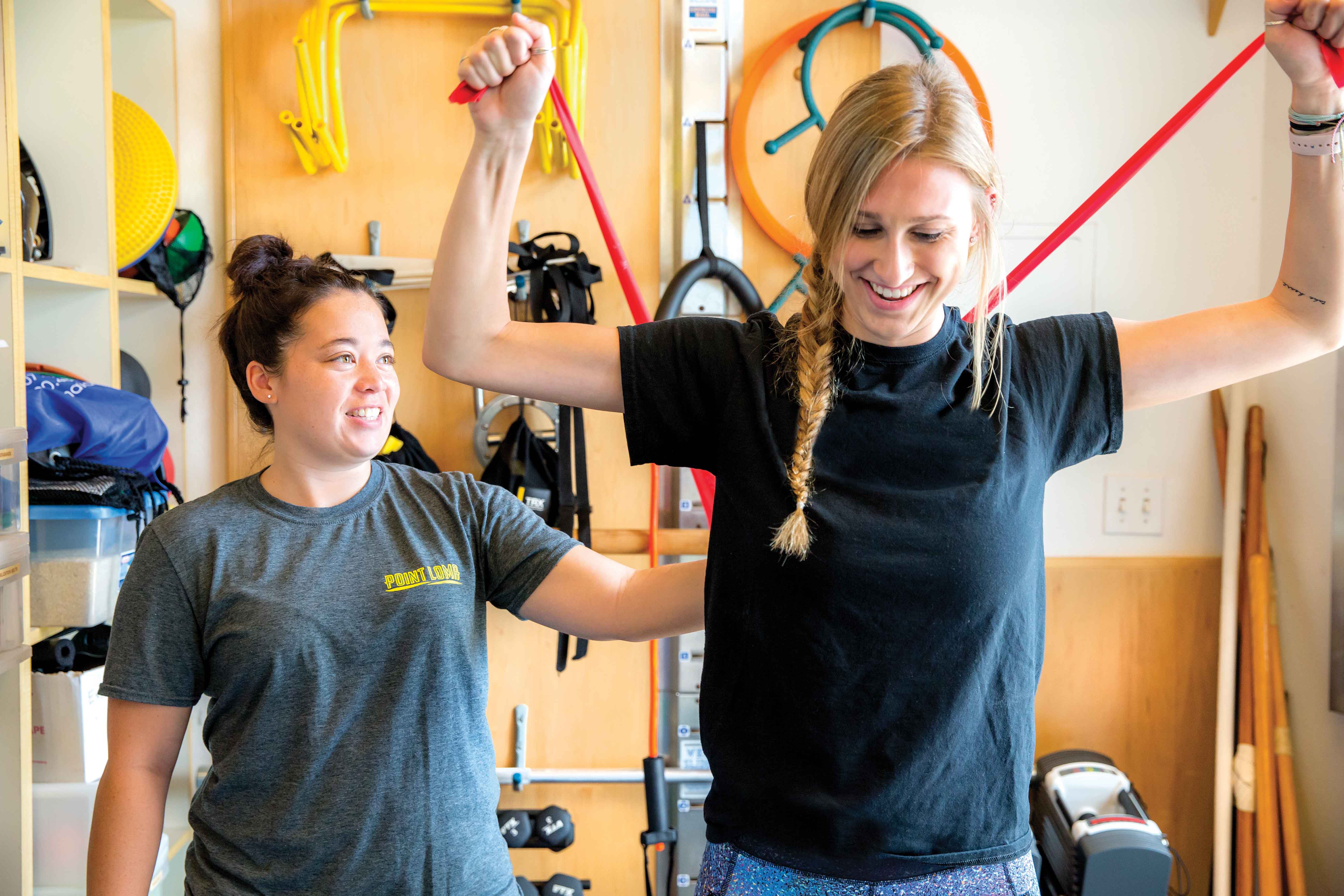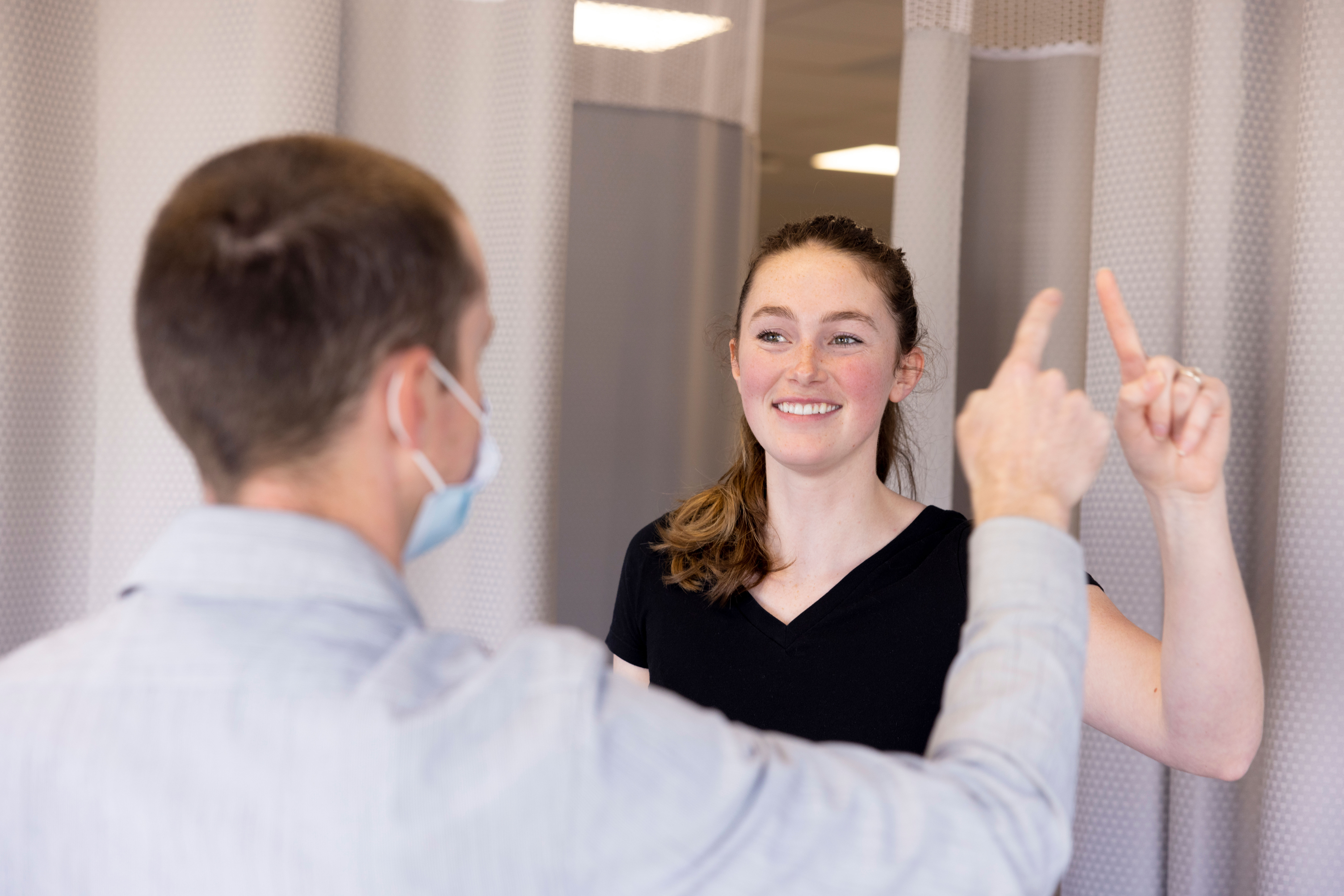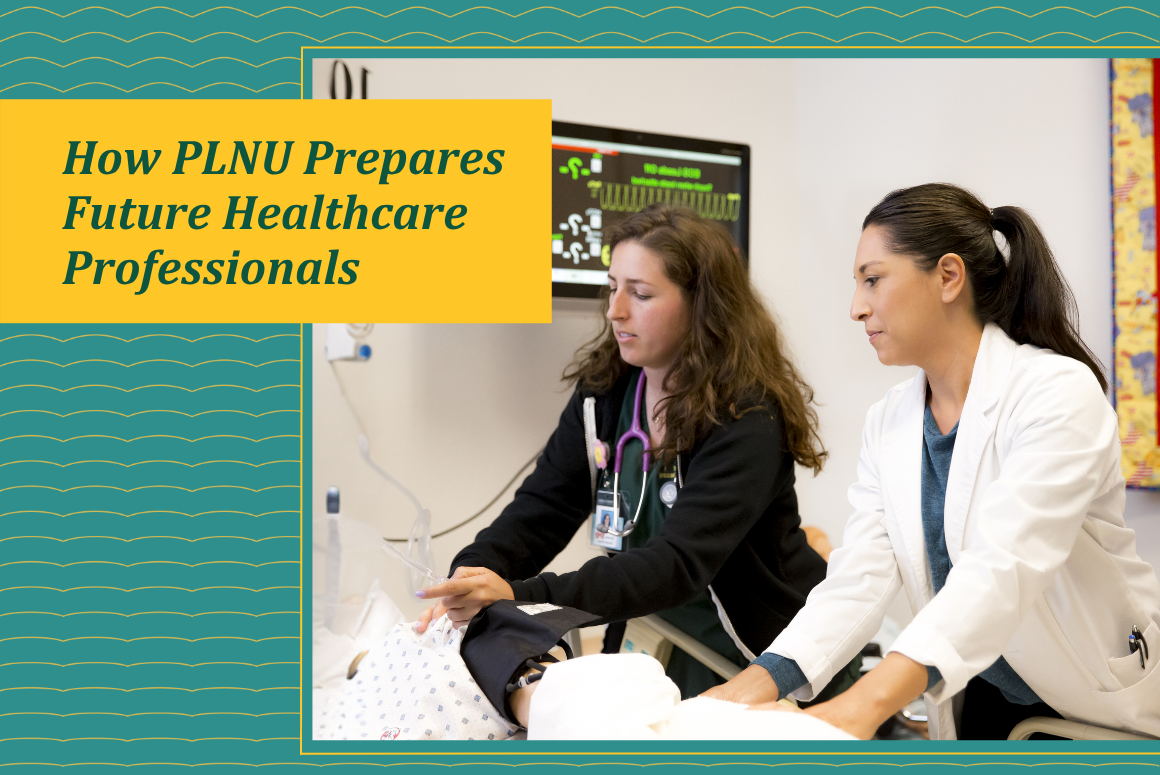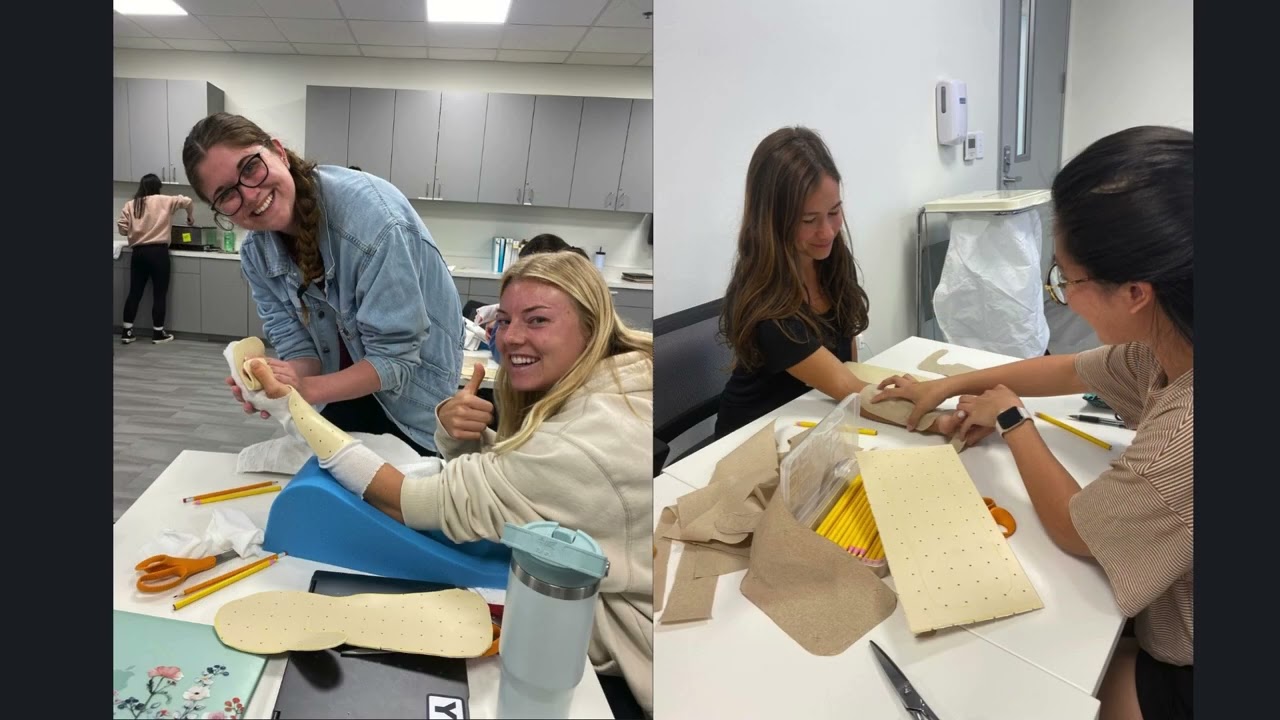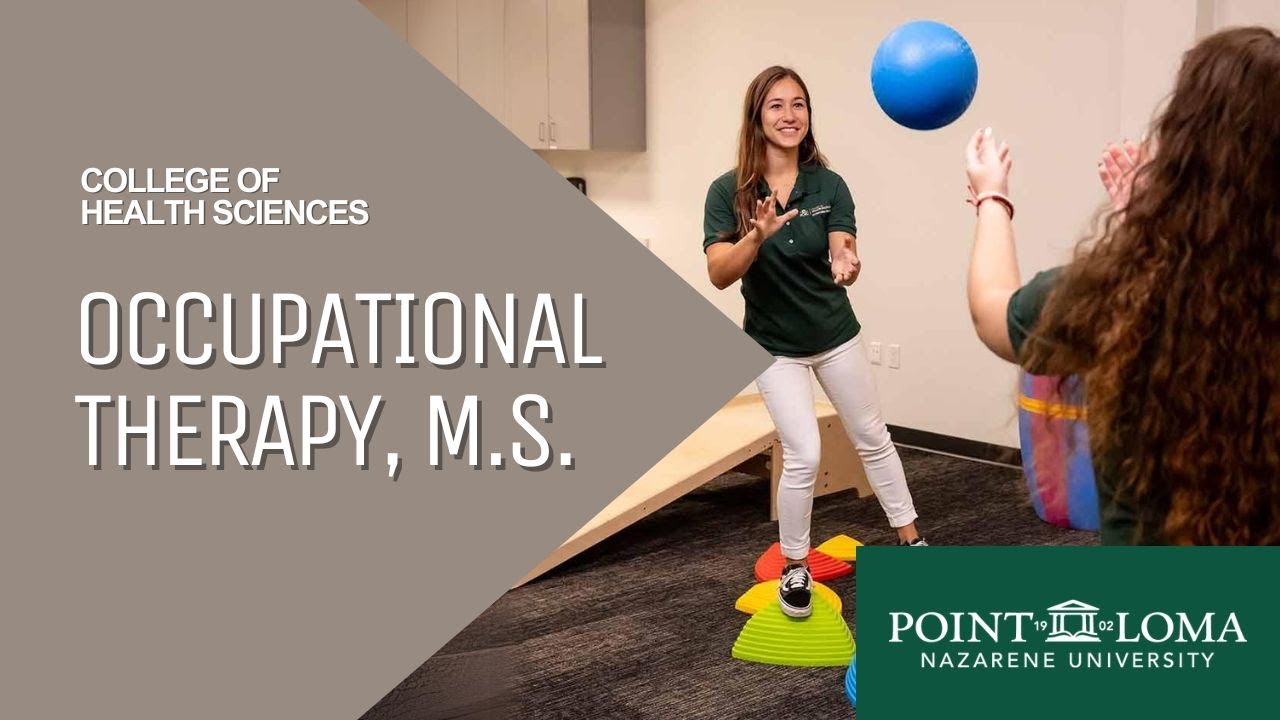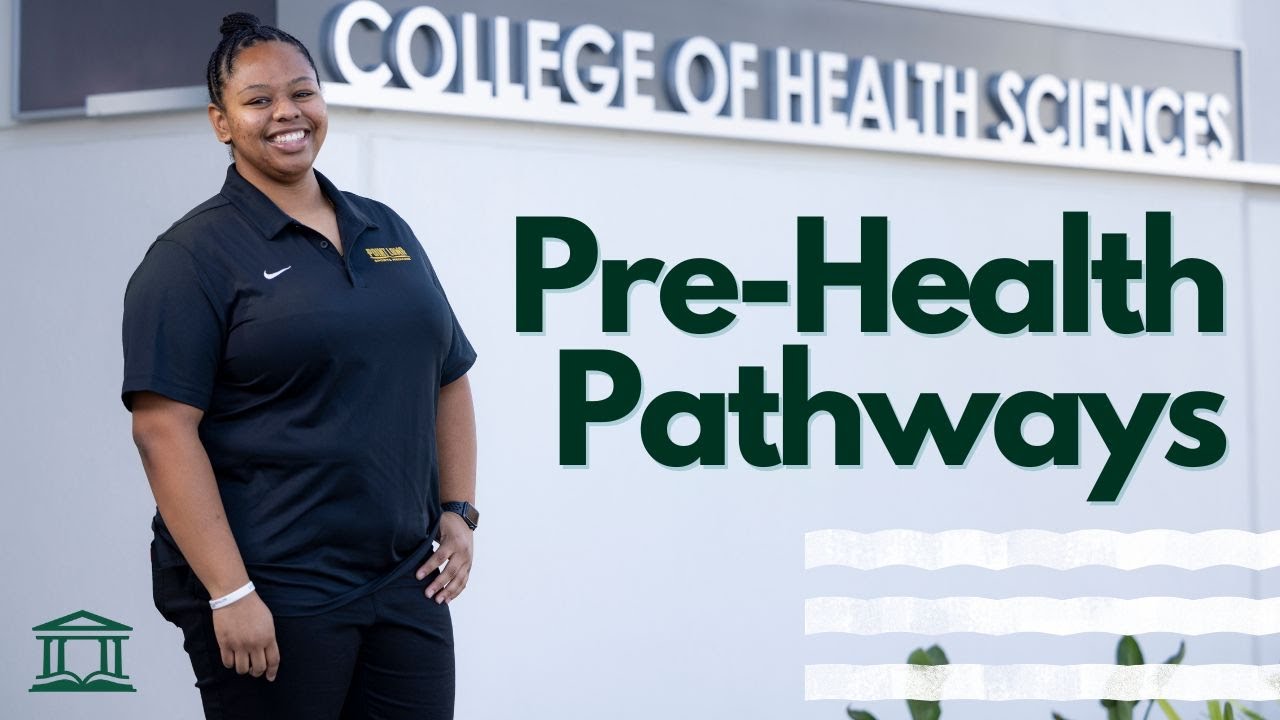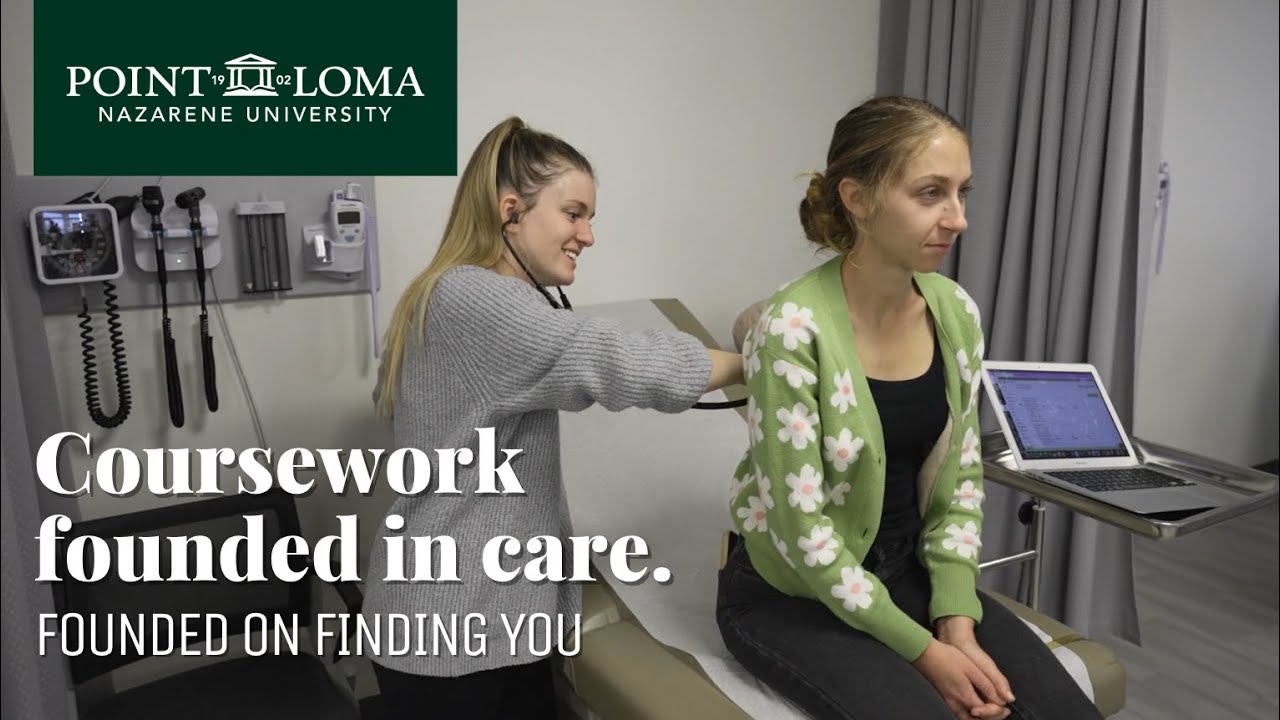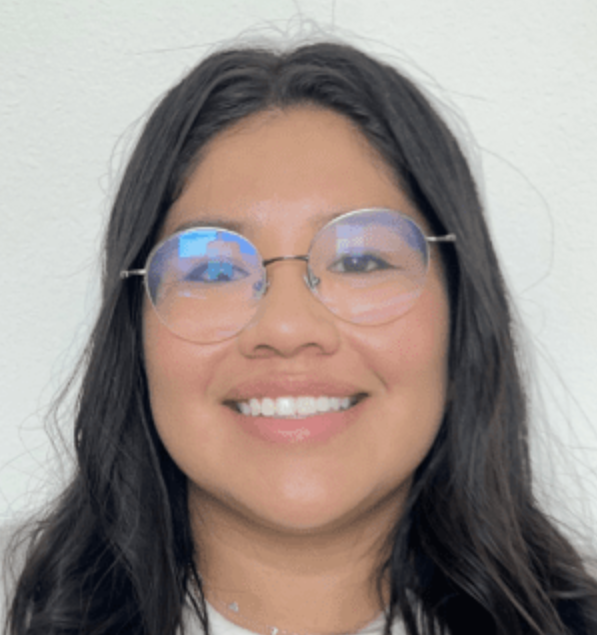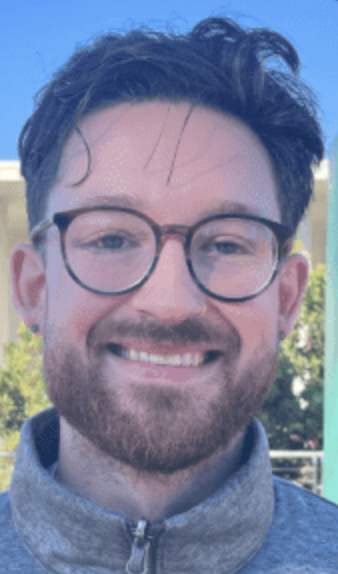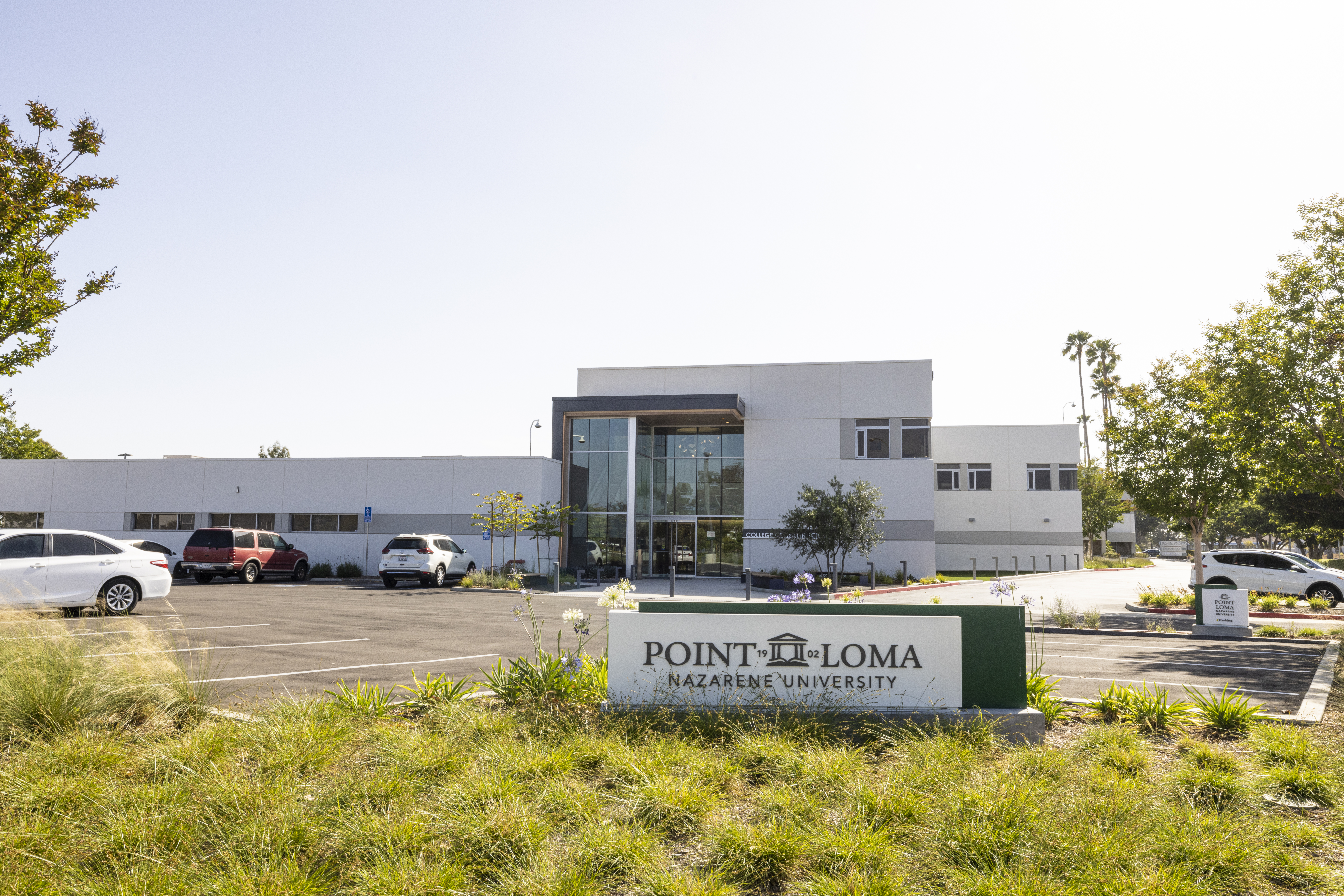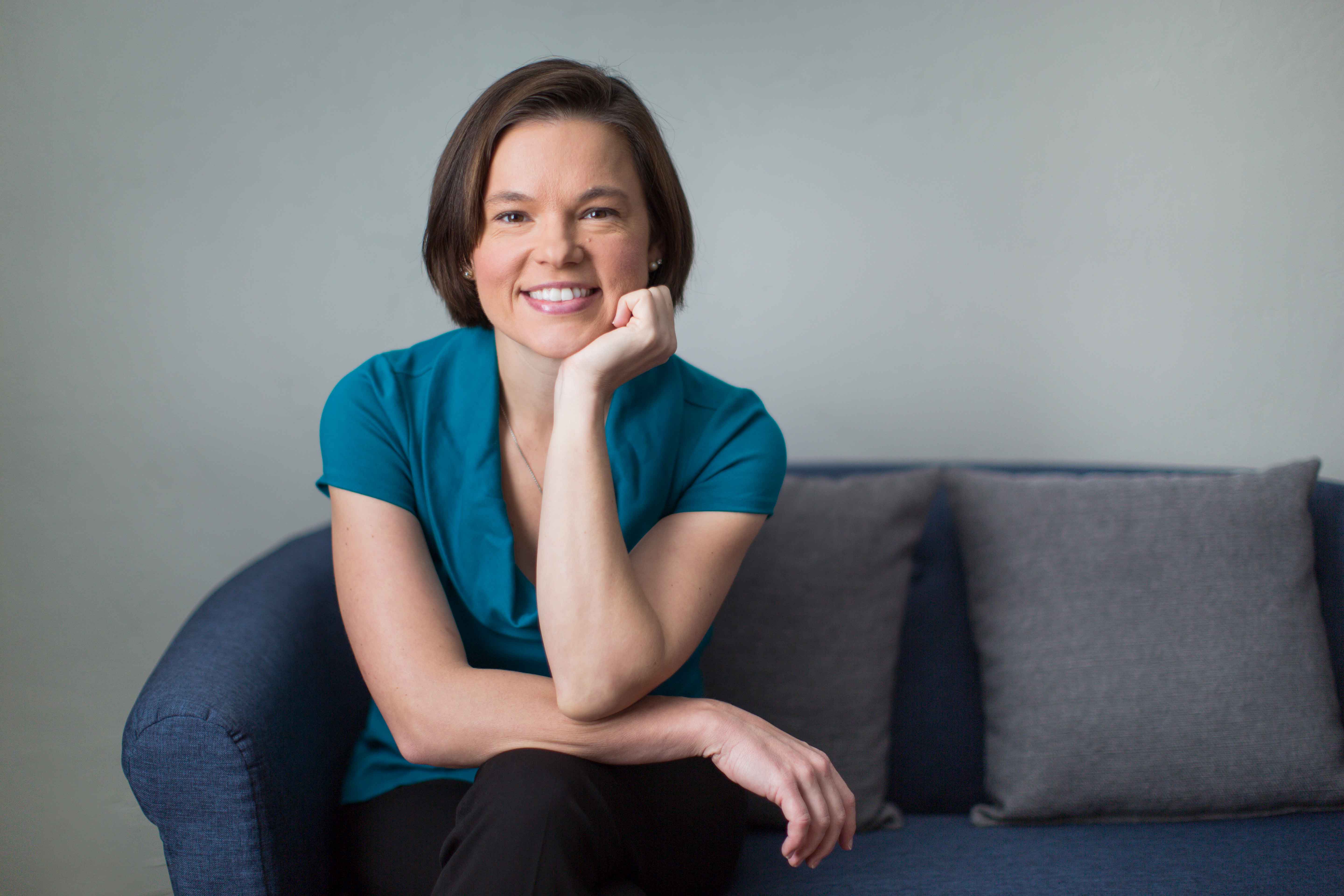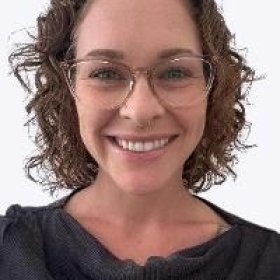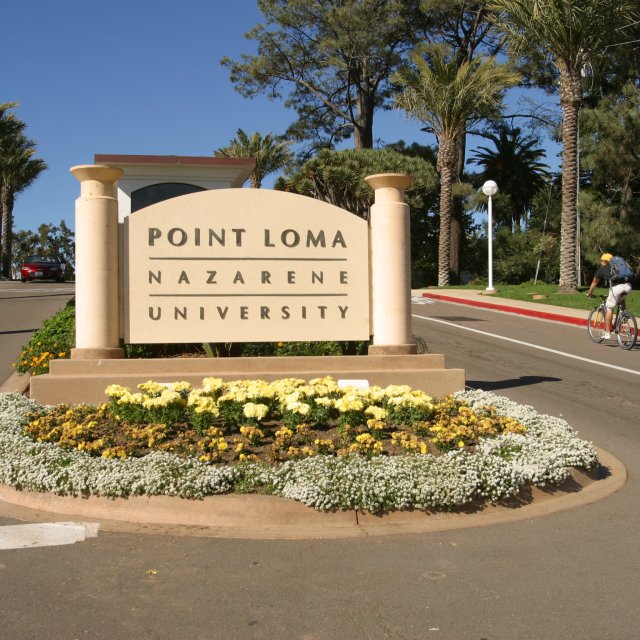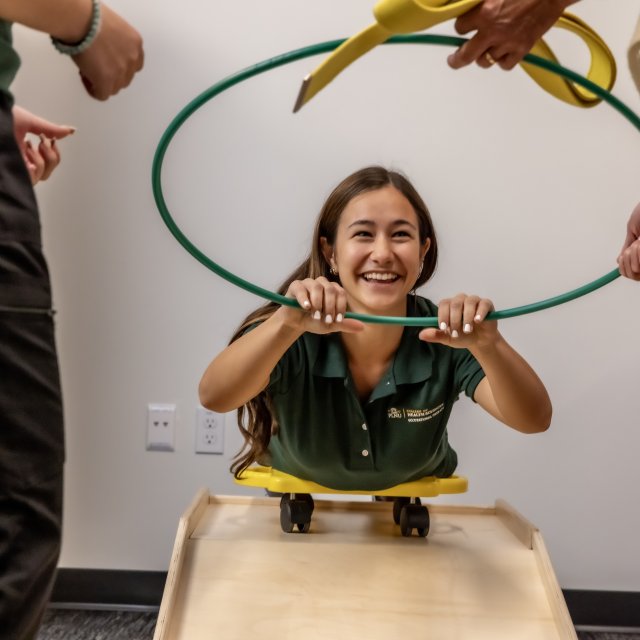Become an Occupational Therapist at a university prioritizing high-quality academic education with a mission-driven Christian purpose of serving those in need. PLNU offers individualized student attention with small faculty-to-student ratios, various student supports, opportunities to engage with other disciplines in the College of Health Sciences, four clinical experiences during didactic learning, and state-of-the-art classroom and lab spaces.
Overview
Occupational Therapy Quick Links
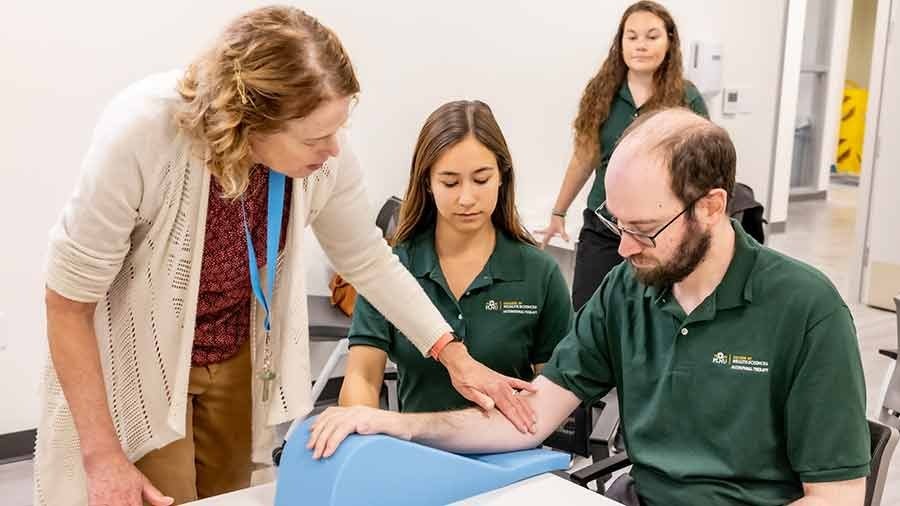
Admission & Graduation Requirements
Applicants to the program must apply online using the Occupational Therapy Centralized Application Service (OTCAS). Get all the details here.
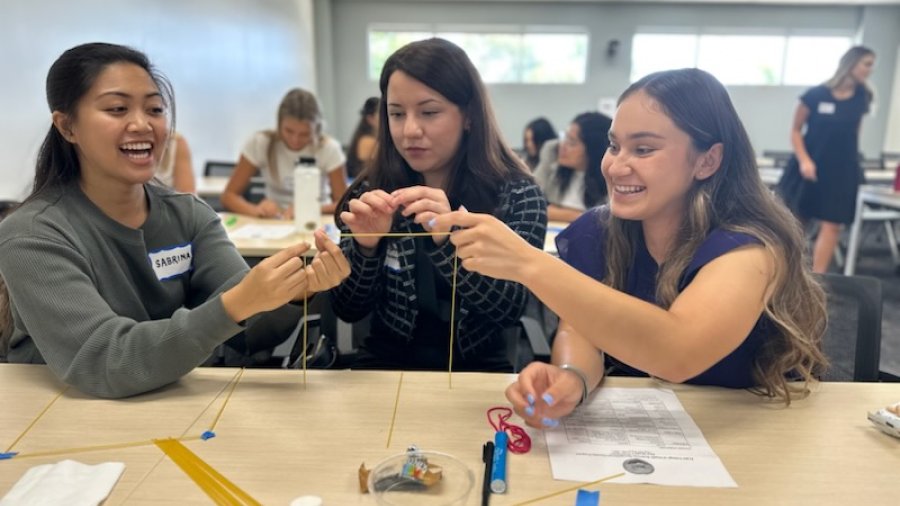
Accreditation & Board Pass Rates
View the accreditation details for the OT program and the data behind how we are tracking toward success here.
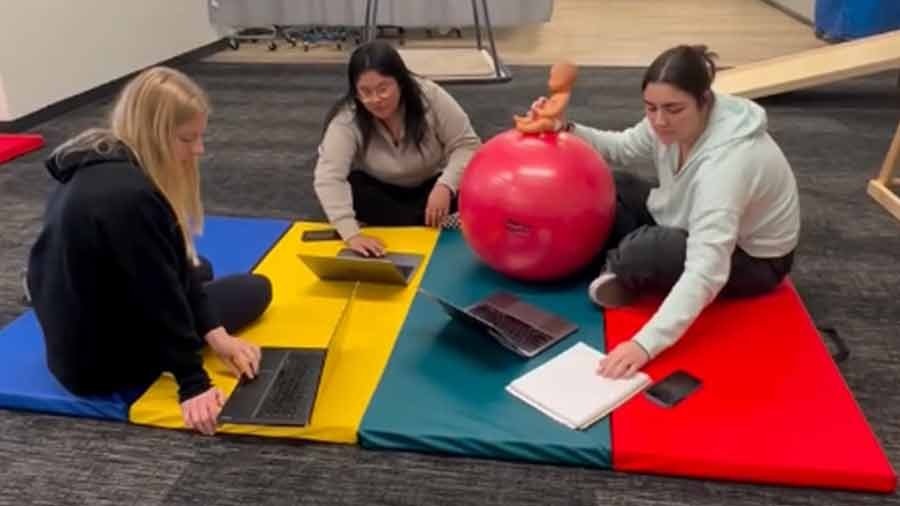
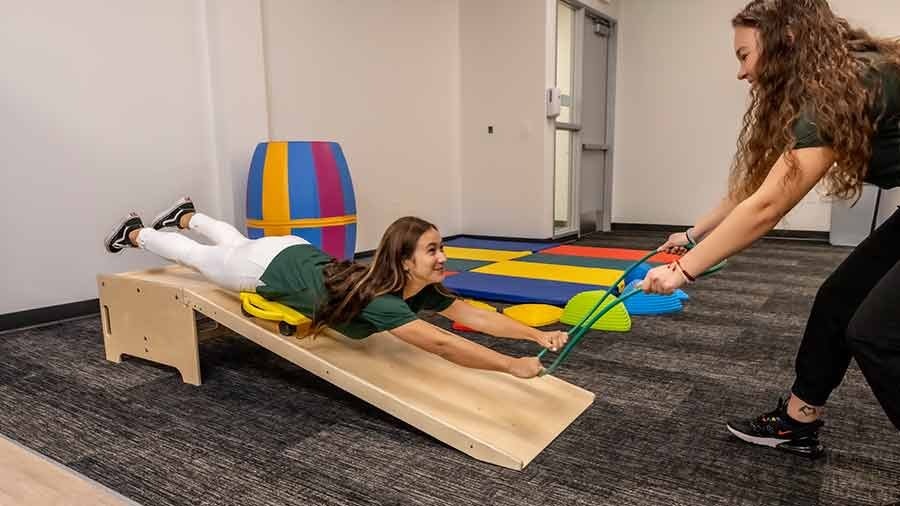
OT Curriculum Design
Our program is committed to providing an interdisciplinary approach to healthcare and offers students the opportunity to interact with other disciplines throughout the program.
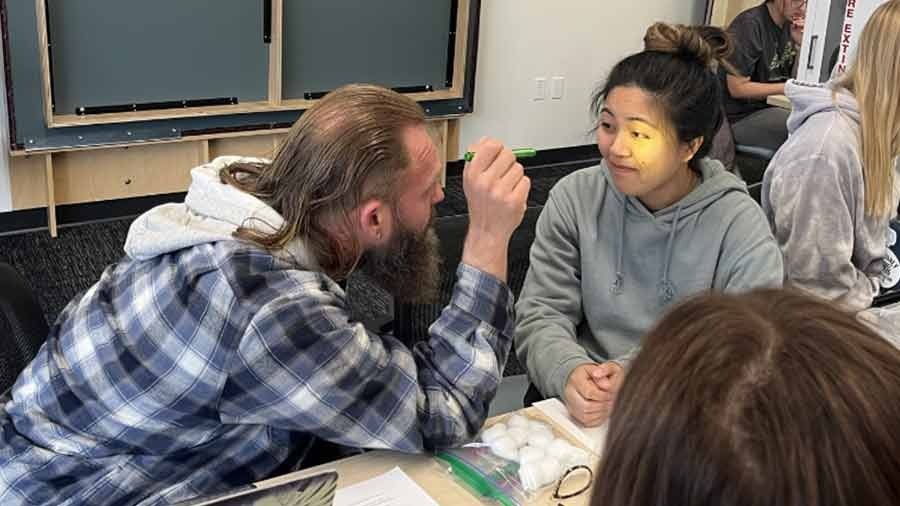
OT Student Essential Functions
View the required aptitudes and abilities for students to participate in this program.
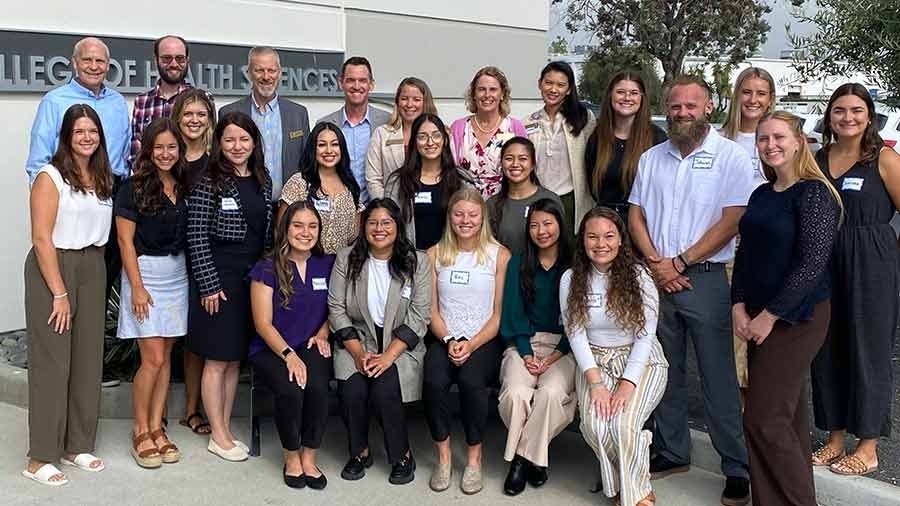
OT Handbooks
Students enrolled in the Occupational Therapy program must read and follow the OT handbook.
PLNU Program Highlights
Students in the occupational therapy program at PLNU can expect a hands-on, evidence-based master’s curriculum that prepares them to improve the health and wellness of others. Students will connect with fellow healthcare professionals and clients, as well as serve within a variety of academic, clinical, and community settings.
In keeping with the mission of the University, the mission of the PLNU Occupational Therapy program is to produce competent and professional graduates who provide evidence-based and occupation-focused interventions that serve others as an expression of faith.
"My first year studying at Point Loma’s College of Health Sciences has given me the chance to pursue my career dreams. I feel deeply appreciative that I have the opportunity to study in an environment that pushes me to excel both academically and spiritually. I feel the support of staff and professors who invest in students and equip us for the reality of a life in healthcare. While I still have much to learn, I look forward to the knowledge I can gain each day to become a better occupational therapist. I hope to make a difference in the lives of each client that I have the chance to work with. After graduation, I hope to pursue pediatric OT in a hospital setting to be a light in some of the most vulnerable times a family can experience."
Learning Outcomes
Program Learning Outcomes
- The Point Loma Nazarene University Master’s in Occupational Therapy Program Graduate will be able to:
- Use critical reasoning to provide evidence-based occupational therapy services across the lifespan, in a variety of service delivery models, health care settings, and community-based systems.
- Develop and utilize a therapeutic use of self during client interactions, which supports the client’s engagement in occupational therapy, and achievement of the clients’ goals.
- Provide services within a client-centered and occupation-based framework, with consideration of contextual factors, which influence a person, groups’ and/or populations’ ability to engage in meaningful occupational tasks and roles.
- Demonstrate compliance with legal, ethical, and professional standards when interacting with clients, service providers, and/or systems.
- Exhibit the ability to document, manage, and evaluate outcomes of services provided.
- Develop clinical programs, which meet a need for underserved persons, groups, and/or populations in the community.
- Embrace diversity, equity, and inclusion in clinical practice through the delivery of high-quality, accessible, and culturally responsive care within a technological and global environment.
- Advance the awareness and ability to work collaboratively with interdisciplinary team members to enhance the provision of client-centered, quality occupational therapy services.
Accreditation
Accreditation
The Master of Science in Occupational Therapy (MSOT) program is accredited by the Accreditation Council for Occupational Therapy Education (ACOTE) of the American Occupational Therapy Association (AOTA), located at 7501 Wisconsin Avenue, Suite 510E, Bethesda, MD 20814. ACOTE’s telephone number, c/o AOTA, is (301) 652-AOTA, and the website is acoteonline.org.
Graduates are eligible to take the national certification examination for occupational therapists, administered by the National Board for Certification in Occupational Therapy (NBCOT). Upon passing, they earn the credential Occupational Therapist, Registered (OTR).
In addition, all states require licensure to practice; however, state licenses are usually based on the results of the NBCOT Certification Examination. A felony conviction may affect a graduate’s ability to sit for the NBCOT certification examination or attain state licensure.
Fieldwork Requirement
Students must complete 24 weeks of Level II fieldwork within 24 months of finishing the didactic portion of the program to meet graduation requirements.
Board Exam Pass Rates & Licensure Info
National Board for Certification in Occupational Therapy (NBCOT®) Exam Pass Rate
The Point Loma Nazarene University Master of Science in Occupational Therapy Department will publish its Occupational Therapy National Certification Exam (NBCOT®) pass rates for the five most recent graduating classes when this information becomes available.
PLNU Licensure and Professional Certifications Information
Point Loma Nazarene University has determined that completion of the Master of Science in Occupational Therapy degree prepares graduates to apply for licensure in any of the 50 states. Licensure is required for occupational therapists and each state sets its own requirements for a license as an occupational therapist. To obtain a license, an individual must graduate from a U.S. OT program accredited by the Accreditation Council for Occupational Therapy Education (ACOTE®) and pass the National Board for Certification in Occupational Therapists (NBCOT®).
For more information about PLNU’s master’s in occupational therapy program, contact ot@pointloma.edu.
Occupational Therapy Labs Provide Hands-on Experiential Learning
The MS-OT Program has three lab spaces, totaling 4,059 square footage, specifically designed for OT students. These lab spaces represent the various types of treatments provided by occupational therapists. Also within the Balboa Regional Center, there are numerous student lounges, study spaces, and a new 8000-square-foot green space for relaxing and playing light sports in between classes.
The Activities of Daily Living Lab
This lab simulates living in an apartment and contains an office, bedroom, living room, laundry, kitchen, and bathroom. In this space, students learn how to prescribe and use adaptive equipment such as a raised toilet seat, bath benches, and grab bars.
Orthotics and Modality Lab
In the orthotics and modality lab, students learn how to make splints for patients, use 3-D printing to fabricate adaptive equipment for clients and gain competency in the application of thermal and electrical modalities.
Movement Lab
The largest space, the movement lab, is designed to teach students how to provide treatment for children with special needs. This lab also includes a hospital environment, and space to learn how to provide rehabilitation for people with physical disabilities.
Clinical Experiences
Students engage in one, community-based clinical experiences with underserved populations; three, level I fieldwork experiences; and two, full-time level II fieldwork experiences at the completion of their learning.
We work with students to provide meaningful and appropriate Level II fieldwork experiences based on the student’s desires, needs, and accreditation requirements.
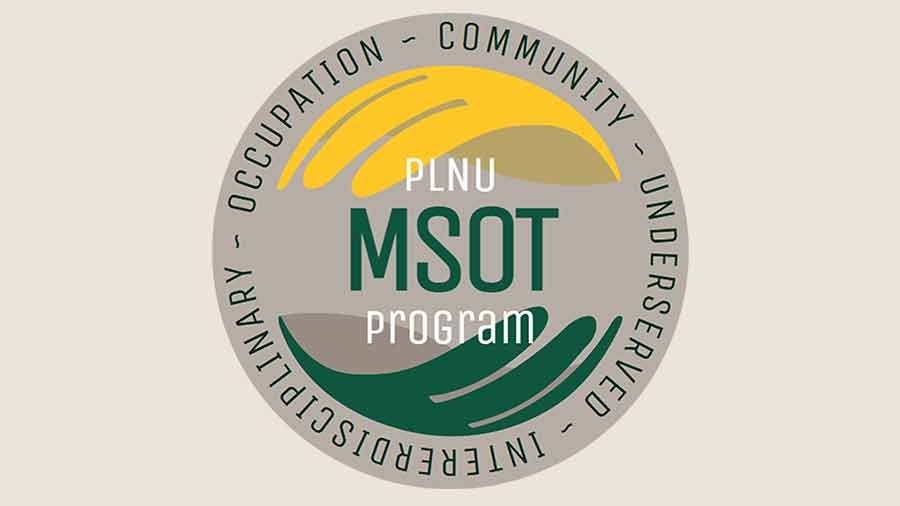
OT Curricular Threads
The OT program’s emphasis is on providing occupation-based services to individuals, groups, and populations in the community who are underserved and are not receiving OT.
Helping People Live Life to the Fullest
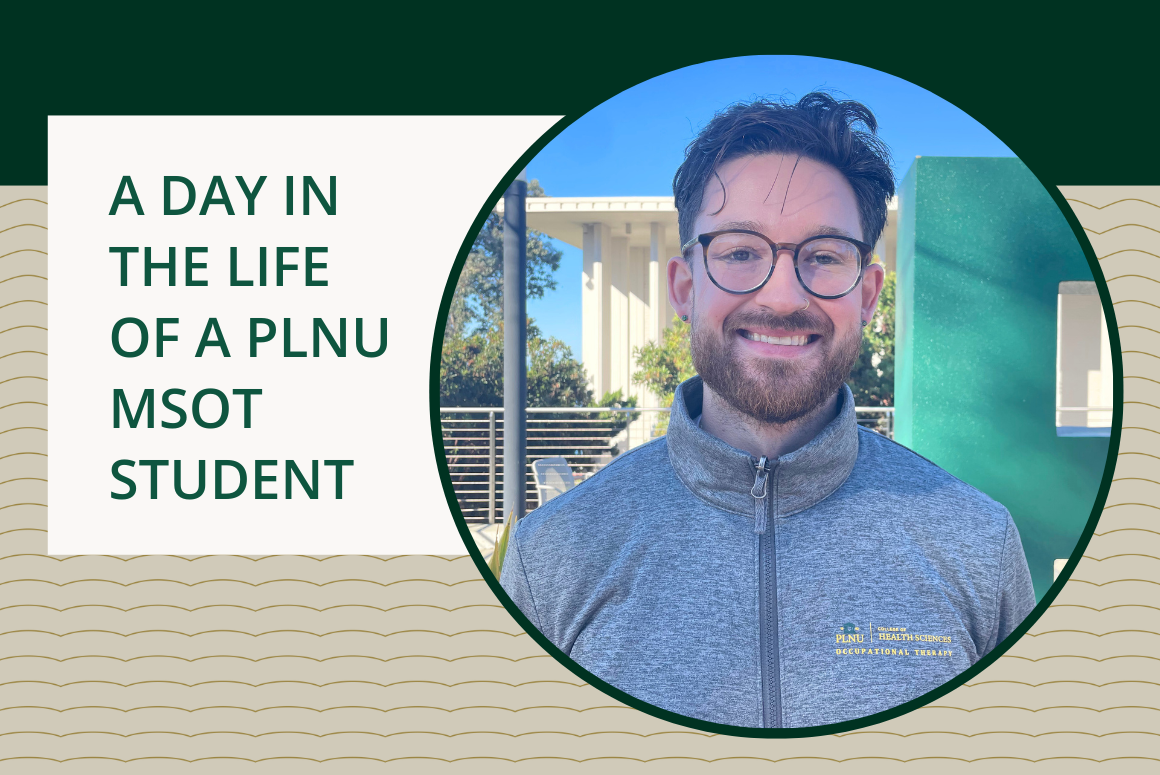 A Day in the Life of a PLNU MSOT Student
A Day in the Life of a PLNU MSOT Student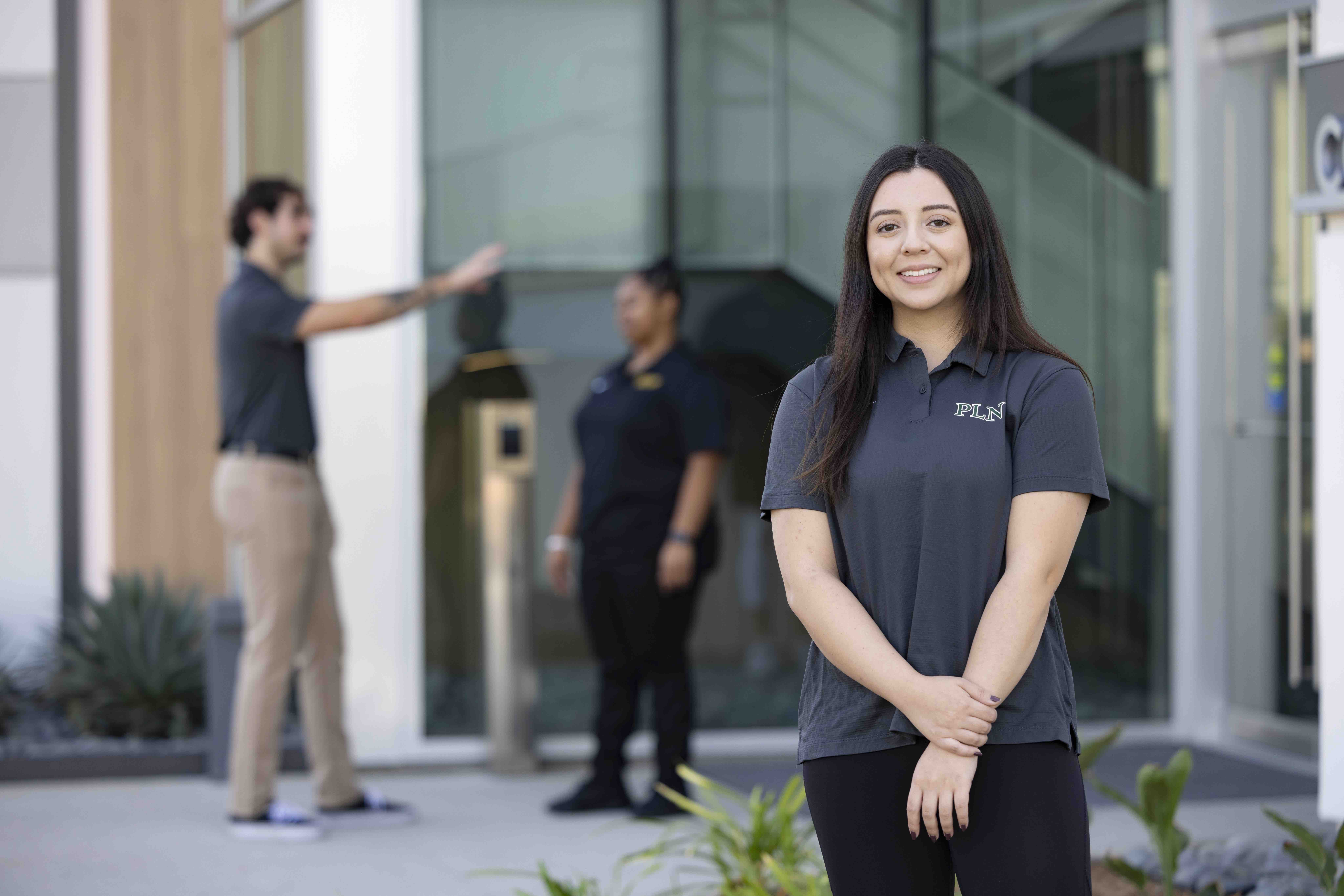 Everything to Know About Occupational Therapy School
Everything to Know About Occupational Therapy SchoolApplication Information
Program Start Date(s):
- Fall 2026 — August 31, 2026
Application Deadline(s):
- Priority Application Deadline — April 1, 2026
- Application Deadline — June 26, 2026
- The 2025 OTCAS Cycle ends on June 16th, 2026.
OT Centralized Application Service (OTCAS)
- The Master of Science in Occupational Therapy program utilizes the portal, the Occupational Therapy Centralized Application Services (OTCAS) for submission of all applicant information.
- To learn more about the OTCAS application process and to create your OTCAS account, please visit the OTCAS portal. The deadline for having a complete and verified OTCAS application is indicated on the Occupational Therapy program page.
- All documents related to admission must be uploaded to the OTCAS will be automatically sent to the graduate admissions office.
- For more information about how to navigate OTCAS, please refer to the video below.
Application Criteria
To view the complete admissions requirements, including required experience, prerequisite courses, graduation requirements, and more click the button below.
Career Opportunities
The main responsibilities of occupational therapists include:
- Treating injured, sick, or disabled patients by reteaching and helping them complete everyday activities.
- Utilizing intervention therapy and adaptive equipment (such as wheelchairs, eating aids, etc.) to teach basic skills (such as managing time, budgeting, etc.) in order to help their patients move and function on their own.
- Working with people of all ages – from infants to seniors.
Common places occupational therapists work include:
- Hospitals
- Inpatient rehabilitation facilities
- Skilled nursing facilities
- Adult and pediatric outpatient clinics
- School systems
- Early intervention in the home
- Mental health (acute care and community settings)
- Private practice
Graduates of the PLNU Master’s in Occupational Therapy Program will be able to:
- Use critical reasoning to provide evidence-based occupational therapy services across the lifespan, in a variety of service delivery models, health care settings, and community-based systems.
- Develop and utilize a therapeutic use of self during client interactions, which supports the client’s engagement in occupational therapy, and achievement of the clients’ goals.
- Provide services within a client-centered and occupation-based framework, with consideration of contextual factors, that influence a person, and/or populations’ ability to engage in meaningful occupational tasks and roles.
- Demonstrate compliance with legal, ethical, and professional standards when interacting with clients, service providers, and/or systems.
- Exhibit the ability to document, manage, and evaluate outcomes of services provided.
- Develop clinical programs, which meet a need for underserved persons, groups, and/or populations in the community.
- Embrace diversity, equity, and inclusion in clinical practice through the delivery of high-quality, accessible, and culturally responsive care within a technological and global environment.
- Advance the awareness and ability to work collaboratively with interdisciplinary team members to enhance the provision of client-centered, quality occupational therapy services.
Growing to Help Others Do the Same
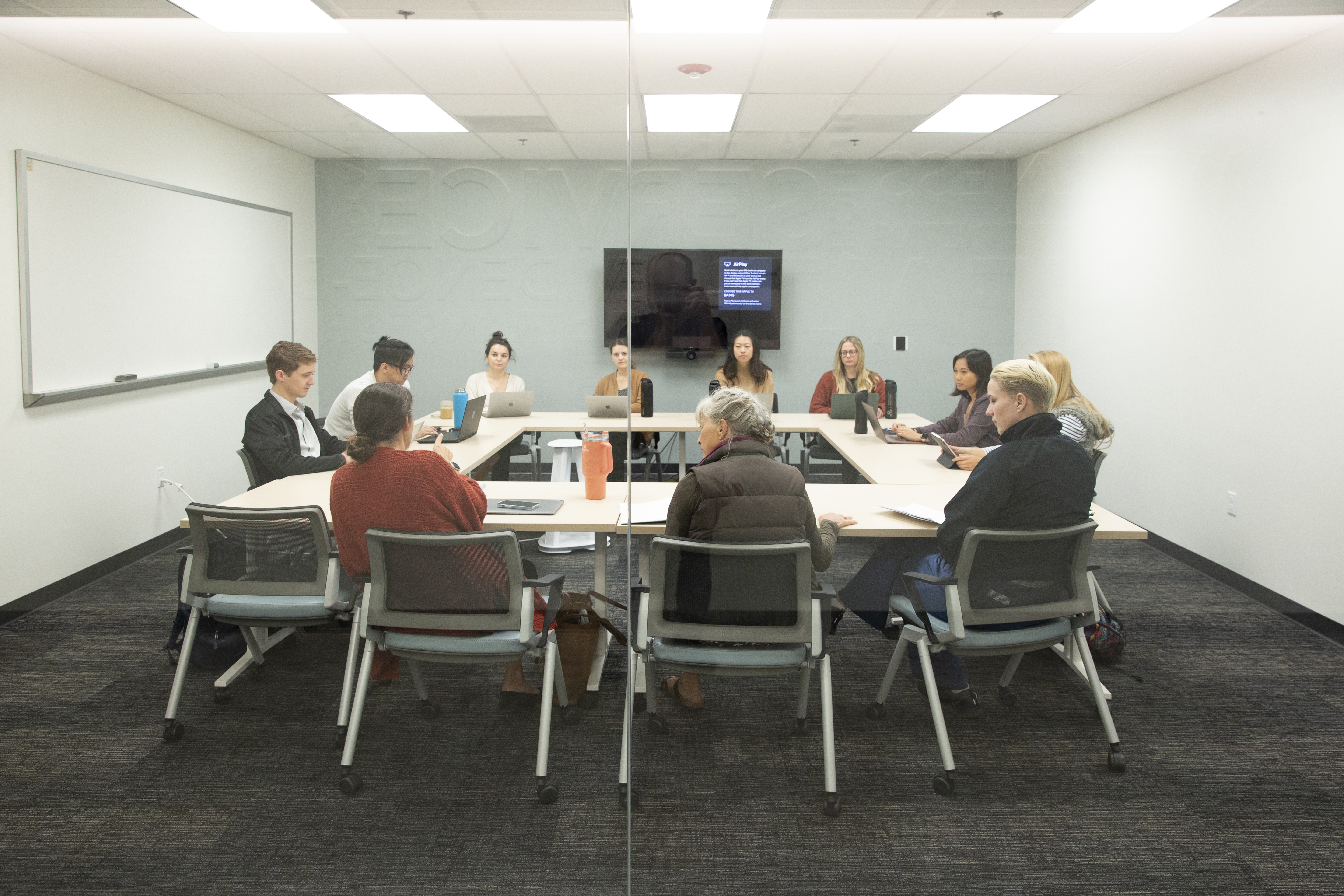

Financial Aid and Student Support
We take seriously the role of providing you with financial, academic, and career support so you have the tools you need to be successful at PLNU and beyond. That’s why we offer a holistic support system that focuses on your unique experiences, particular needs, and personal and professional goals — resulting from our deep concern for you, our student.
With a focus on authentic relationships and personalized attention, our goal is to help transform you so you can follow your calling in your own career and life.
Tuition and Fees: OT Program
See a full cost breakdown, year-by-year for the Occupational Therapy, M.S. program.
| CLASS OF 2025 (Year Three) Year/Semester | Tuition/Credit Unit | Number of Credit Units/Semester | Total Tuition Cost |
|---|---|---|---|
| 2025 | |||
| Fall Semester | $1,273.00 | 6 | $7,638.00 |
| TOTAL TUITION - YEAR THREE | $7,638.00 | ||
| Program Fees** | $125.00 | ||
| Graduation Fees | $120.00 | ||
| TOTAL TUITION & FEES | $7,883.00 | ||
| TOTAL PROGRAM COSTS | $109,219.00 |
| CLASS OF 2026 (Years Two & Three) Year/Semester | Tuition/Credit Unit | Number of Credit Units/Semester | Total Tuition Cost |
|---|---|---|---|
| YEAR TWO* | |||
| 2025 | |||
| Fall Semester | $1,273.00 | 11 | $14,003.00 |
| 2026 | |||
| Spring Semester | $1,273.00 | 17 | $19,095.00 |
| Summer Semester | $1,273.00 | 14 | $7,638 |
| TOTAL TUITION - YEAR TWO | $40,736.00 | ||
| Program Fees** | $240.00 | ||
| Lab Fees** | $331.00 | ||
| TOTAL TUITION & FEES - YEAR TWO* | $41,307.00 | ||
| YEAR THREE | |||
| 2026 | |||
| Fall Semester | $1,273.00 | 6 | $7,638.00 |
| TOTAL TUITION - YEAR THREE | $7,638.00 | ||
| Program Fees** | $125.00 | ||
| Graduation Fees | $120.00 | ||
| TOTAL TUITION & FEES | $7,883.00 | ||
| TOTAL PROGRAM COSTS* | $100,772.00 |
| CLASS OF 2027 (Years One & Two) Year/Semester | Tuition/Credit Unit | Number of Credit Units/Semester | Total Tuition Cost |
|---|---|---|---|
| YEAR ONE | |||
| 2025 | |||
| Fall Semester | $1,273.00 | 18 | $22,914.00 |
| 2026 | |||
| Spring Semester | $1,273.00 | 18 | $22,914.00 |
| Summer Semester | $1,273.00 | 13 | $16,549.00 |
| TOTAL TUITION - YEAR ONE | $62,377.00 | ||
| Program Fees** | $300.00 | ||
| Lab Fees** | $280.00 | ||
| TOTAL TUITION & FEES - YEAR ONE | $62,957.00 | ||
| YEAR TWO* | |||
| 2026 | |||
| Fall Semester | $1,273.00 | 17 | $21,641.00 |
| 2027 | |||
| Spring Semester | $1,273.00 | 6 | $7,638.00 |
| Summer Semester | $1,273.00 | 6 | $7,638.00 |
| TOTAL TUITION - YEAR TWO | $36,917.00 | ||
| Program Fees** | $395.00 | ||
| Graduation Fees | $120.00 | ||
| TOTAL TUITION & FEES - YEAR TWO* | $37,432.00 | ||
| TOTAL PROGRAM COSTS* | $100,389.00 |
*Estimated 3-4% increase in costs for year two tuition, program, and lab fees.
**Program fees are utilized for professional organization memberships, required clinical clothing, and access to online educational resources. Lab fees are associated with supplies used in lab courses. Total costs for this program does not include health requirements needed to enter the program and/or to fulfill fieldwork requirements, clinical site parking costs, housing during clinical experiences, and transportation to clinical sites.
Occupational Therapy Scholarship Information
PLNU is committed to helping students finance their education through loans and scholarships. Click here for more information about potential scholarship sources to finance your first and second years of the program.
We’re excited to announce that the application deadline for the Excellence in Service Internal Scholarship for first-year students has been extended to January 31, 2026.
If you’re passionate about making a difference through service and leadership in occupational therapy, don’t miss this opportunity to apply for additional support toward your graduate education!
Frequently Asked Questions
What is required to be admitted into this program?
To be admitted into PLNU's MSOT program, you must have a baccalaureate degree from a regionally accredited institution, as evidenced by an official transcript that indicates the completion of an undergraduate degree. You must also have a 3.0 in your most recent 60 credit hours.
How many days/week do classes meet?
90% of classes are face-to-face, held mostly during normal working hours (8-5:00 pm) Monday-Friday.
Can I work while completing this program?
This program is a fully face-to-face, hands-on program that will require a full-time commitment. It is challenging to work more than part-time due to the demands of this program but this is an individual decision.
What is the minimum number of observation hours needed to apply?
A minimum of 40 hours of observation is required prior to the application deadline; preferably in more than one occupational therapy setting. However, there are alternative methods of gaining observation hours. Refer to our PLNU OT website and/or OTCAS for alternative methods.
How many cohorts start each year?
One cohort of 40 students will start each year at the end of August/fall term.
Is the GRE required for admission?
No, the GRE is not required. If provided in OTCAS, your GRE score will not be reviewed by the PLNU MSOT admissions committee.
What are fieldwork expectations?
Fieldwork Level 1 is scheduled during terms 2,3, and 4, and is performed in three different settings: mental health, pediatric, and adult/older adult. Level I fieldwork allows students 'real-world' clinical experiences. The student is required to successfully complete all three Level I fieldwork experience to progress to next courses and Level II Fieldwork
Fieldwork Level 2 consists of two, 12-week assignments at various occupational therapy settings under the direct supervision of an occupational therapist. Students work closely with the Academic Fieldwork Coordinator to determine the best location and OT environment for the student.
Will I have to travel for my Level II fieldwork?
Most students will need to travel to a clinical site, which may be located anywhere in the United States. Every effort is being made to secure sites in the San Diego area and southern CA, but due to the high demand for clinical placement sites, you may be expected to travel within the U.S.
Can I transfer credits to PLNU's MSOT from another program?
No, the PLNU MSOT program does not accept transfer credits from another university.
Are international students able to apply?
Yes! As an international student, you can apply as a senior in university or any time after you obtain your bachelor’s degree. If you earned your baccalaureate degree outside of the United States, all documents must be translated into English and evaluated by members of National Association of Credential Evaluation Services (NACES). You must also submit official proof of English proficiency (TOEFL). Please contact Graduate Financial Aid and Student Support Services for more information.
We also will accept a 110 minimum score from DuoLingo as proof of proficiency.
PLNU is a Christian university, but I am not a Christian. Would I feel out of place in this program?
We welcome and encourage people of all backgrounds as students in our programs. Issues that relate to faith may be discussed in some classes, and engaging in discussion with individuals with alternative points of view will be encouraged as learning opportunities. Students will work within a learning community that is supportive academically, spiritually, and emotionally.
Course List
For information about the courses required for the Occupational Therapy, M.S. program, view the PLNU Catalog.
Students can enroll in these online courses to meet the anatomy and physiology prerequisites requirement.
